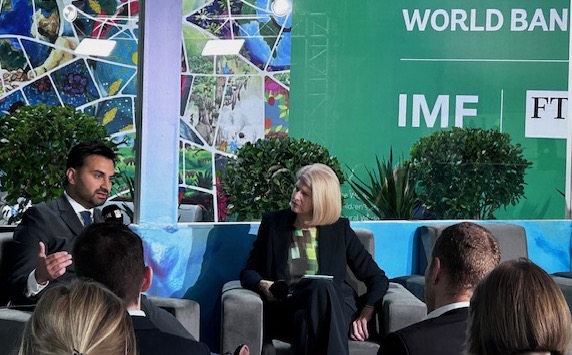
By Gary Cuneen, Seven Generations Ahead
November 12, 2024
As COP29 shifts into gear you can imagine that there has been a lot of conversation already about what will happen to US climate change efforts and its role at COP moving forward now that Donald Trump has been elected. John Podesta, Senior Advisor to the President for International Climate Policy, spoke last night and this morning (at a US Center forum I attended) and said pointedly that “the fight is bigger than one election in one political cycle in one country” and that state and local governments and coalitions will continue to move this agenda forward.
This morning I also attended a session hosted by the World Bank Group and had the opportunity to listen and ask questions to Ali Zaidi, Assistant to the President and National Climate Advisor. Zaidi emphasized that we managed to get through the first election of Trump and that Trump had difficulty reversing low carbon fuel and solar credit initiatives (which were hung up in court) and now we are further ahead with respect to clean energy infrastructure, manufacturing jobs and deployment than before and we have a lot of economic momentum.
When I asked Mr. Zaidi about what factors would most likely inhibit the new administration from repealing the bi-partisan Inflation Reduction Act (IRA) in addition to many red states benefiting economically already, he re-emphasized that many Republican House Representatives have already sent memos to Trump stating how much their states have benefitted from IRA-related new manufacturing jobs and that almost every financial institution in some way is entwined in the implementation progress generated by the IRA (which is linked to 160,000 jobs in red districts and $150 billion in investments). While not denying that the election of Trump will hamper some efforts (Washington Governor Jay Inslee has called Trump’s election a climate “speed bump”), Zaidi emphasized that the private sector and Republican states are a big part of the growing US climate action momentum and that some oil and gas companies have already communicated their wish to not have methane gas regulations repealed because the regulations are giving them an advantage over their polluting competition.
Another theme playing out now at COP29 is the impact of the US election on US climate leadership globally (not to forget that some European countries are facing blowback at the polls), and the emergence of China as a world leader on the global climate stage now that the US federal government will be absent. As many of us in this arena are dumbfounded by the Trump administration’s past (and most likely future) swing and miss opportunity for US economic development and jobs linked to clean energy development, China continues to forge ahead and capture manufacturing and deployment markets across various sectors of the clean energy economy.
Later today, the US and China will discuss their new Methane agreement, which builds upon last year’s methane reduction/elimination pledges by many other countries. As a side note on US progress recently, one million heat pumps are now produced per year in the US with union collaboration; 90% of new energy is now clean energy in the US; and half of US solar power has come on the grid in the past 4 years. SGA’s It’s Our Future Youth Delegation has been crazy busy today interviewing country delegates and climate advocates – and here you can follow one of their daily posts from COP29.
